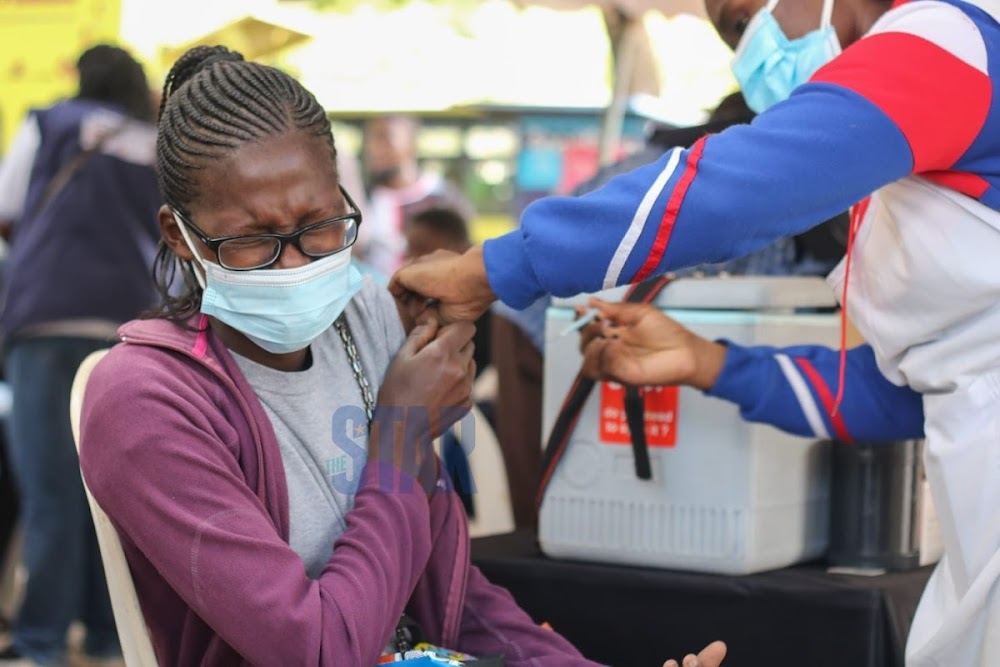

The Ministry of Health said on Sunday the positivity dropped to 13.9 per cent, up from 32 per cent in mid-December.
The rate refers to new positive tests divided by total daily tests.
The decline is a welcome signal but is far from conclusive because the daily virus caseload reporting remains unreliable due to uneven testing and reporting delays.
However, pathologist Dr Ahmed Kalebi, who has been monitoring the trajectory, said he is optimistic the fifth wave is on the downturn.
“Even though new daily caseload and positivity rate are on the decline, hospitalisation and deaths which lag behind the new infections will continue to rise for while. Fortunately, ICU admissions have plateaued. Overall we can be optimistic that the Omicron fifth wave is on the downturn,” he said.
The number of new cases also dropped from the highs of 2,000 in December.
“I am very optimistic that we will see a sustained decline,” said Dr Nelly Yatich, an epidemiologist based in Nairobi.
The ministry said on Sunday 741 people had tested positive for the disease, from a sample size of 5,329 tested in the previous 24 hours.
Last week, 12 deaths caused by Covid-19 were reported, pushing the cumulative fatalities to 5,437 since April 2020.
Dr Kalebi said more deaths will continue to be reported because data on deaths are belatedly collated.
Kenya saw its numbers rise dramatically beginning mid-December. Scientists at the Kenya Medical Research Institute who performed genetic sequencing detected the new, highly transmissible Omicron variant on December 15.
Health CS Mutahi Kagwe on December 19 announced the Omicron variant was now dominant in Kenya.
A total of 1,244 patients are currently admitted in various health facilities countrywide, with 56 being in the Intensive Care Unit, and 21 in the High Dependency Unit (HDU).
The World Health Organisation warns against describing the Omicron variant as mild, saying it is killing people across the world.
“Just like previous variants, Omicron is hospitalising people and it is killing people,” WHO chief Dr Tedros Adhanom Ghebreyesus told journalists on Thursday.
So far, nearly all studies show Omicron variant causes milder disease than other forms of the virus.
Leading microbiologist Prof Walter Jaoko last month told journalists that this could be good news.
“Delta has been the most dangerous variant so far. But there’s no evidence Omicron is more lethal and it could be even less lethal and this could be a good thing,” he told journalists at a webinar.
Late last month, Amref Health Africa boss Githinji Gitahi said many people visiting hospitals seeking coronavirus treatment do not need to be admitted.
“We are not seeing many hospitalisations, oxygen requirement, ICU-HDU as should have been expected, which indicates that maybe its earlier immunity in the bodies of those who are getting infected, vaccination plus early infection or just that the particular variant is mild and not causing severe disease,” he told the VOA.
Omicron remains highly contagious and studies show it can infect people even if they are fully vaccinated. However, vaccines and past Covid-19 infection do help protect against severe disease.
The current data shows the proportion of adults fully vaccinated in Kenya is 16.4 per cent.
However, counties in the northern region have registered low vaccinations, with Tana River having fully vaccinated just 3.6 per cent of the target population.
Others are Turkana with 4.4 per cent, Wajir with 4.6 per cent, Narok with 5.2 per cent, Bomet with 5.3 per cent and West Pokot with 5.3 per cent. Mandera, Garissa, Kilifi, Marsabit and Isiolo have 5.3, 5.4, 5.6, 5.6 and 7.1 per cent respectively.
Last week, CoG chairman Martin Wambora called on leaders in the respective counties to increase awareness and outreach campaigns to boost the numbers that have remained relatively low since the drive started in March last year.
At least 4.1 million people are fully vaccinated across the 47 counties. Out of this number, healthcare workers are 221,893; 82.1 per cent of all the healthcare workers in the country.
-Edited by SKanyara
Article first published on https://countydevelopment.co.ke/kenya-could-be-past-fifth-covid-19-wave-expert-the-star-kenya/
Achuman Emoni stretches her hands, illustrating the vast distance she has travelled to reach the…
During a session held at Africa Health Agenda International Conference in Kigali, Rwanda, on 4th…
Amref Health Africa, in collaboration with the Turkana County Department of Health Services, introduced the…
Amref Health Africa, in collaboration with the Turkana County Department of Health Services, introduced the…
Over the past six years, Amref Health Africa has positioned itself as a leading voice…
Africa has made significant strides in advocating for health research and development, yet gaps in…